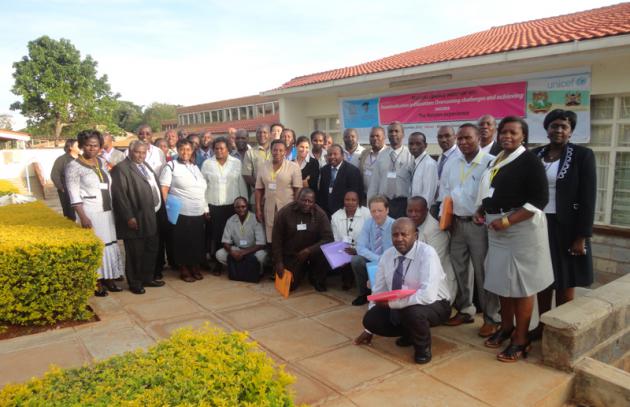23 January 2013
Kenya organized a national policy seminar to discuss IIEP research findings
school_grants_conf_web1.jpg

©Kenyatta University
Participants in the national seminar in Kenya. ©Kenyatta University
Alt Text:
Decentralization: overcoming challenges, achieving success
Title Text:
Decentralization: overcoming challenges, achieving success
In the past few years, IIEP has coordinated extensive research on the implementation of decentralization in the education sector in Eastern and Southern Africa, in particular in Kenya, Lesotho, and Uganda, with a focus on one actor - the District Education Office – and one policy – school grants. The research has been conducted with technical and financial support from UNICEF, and in collaboration with Ministries of Education and national research institutions. While the research findings have been discussed during policy seminars organized at the regional level (Entebbe, Uganda, in February 2010, and Addis Ababa, Ethiopia, in March 2012), the next step is to hold in-depth discussions with the main stakeholders at the national level.
Successful dissemination strategies of research findings and recommendations in Kenya
Following these regional seminars, the national research teams were encouraged to bring the results of the research to the attention of decision-makers in their countries.
Kenya offers a good example of a successful dissemination strategy. The national team – two researchers from Kenyatta University (KU) and two representatives from the Kenyan Ministry of Education – made a presentation on the school grants research findings during the annual conference of the Kenya Primary Schools Head Teacher's Association (KEPSHA), held in Mombasa (Kenya) in September 2012. With 15,000 people in attendance, the presentation received highly positive feedback from participants.
A national policy seminar on ‘Decentralization: overcoming challenges, achieving success’ was then organized in Nairobi (Kenya) on 26–27 November 2012 by KU, the Kenyan Ministry of Education (MoE), IIEP, and UNICEF. Over 50 participants took part, including key decision-makers from the central MoE, and the Teacher Service Commission, senior staff from several County Education Departments and District Education Offices, as well as head teachers from schools visited as part of the research. Discussions focused on the lessons learned through the research.
An event rich in debate, with a focus on identifying strategies for improving policy
Proving to be particularly timely – as a bill outlining the roles of decentralized actors in the Kenyan education system was due to be debated in Parliament by early 2013 – the topic of the seminar generated a great deal of interest. This enthusiasm was reflected both in the liveliness of the discussions and in the press coverage of the event.
Two background papers were presented, one on DEOs and one on school grants, and a Research Brief was prepared for the event, summing up their results. Participants discussed the challenges involved with the decentralization policy and brainstormed on ways to overcome these and adjust the policy so as to improve its results.
This seminar was facilitated by IIEP and UNICEF, which financially and technically supported the process. At the conclusion of the seminar, one head teacher remarked, “I now feel better equipped on the topic of decentralization, with a great deal of knowledge I can pass on confidently to others”. A briefing note detailing the main conclusions coming out of the seminar has been prepared for personnel from the Ministry, at their request.
Preparation of the dissemination phase in the other countries is underway, and colleagues from Uganda and Lesotho are currently assessing possibilities to organize similar policy seminars in their countries, to take place in early 2013. In order to learn from the process of organizing the event, a senior researcher from the team in Uganda also attended the seminar in Nairobi.






